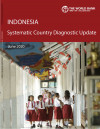The purpose of the World Bank’s Systemic Country Diagnostic (SCD) is to identify the main constraints and opportunities a country faces in continuing to progress towards the World Bank’s twin goals. It analyses trends and drivers of growth, poverty reduction, and income distribution, as well as the policies that underpin them, while assessing the elements constraining more rapid progress and sustainability.
SCDs provide information and data useful in the assessment and diagnostics phase of preparing an integrated national financing framework (INFF). Over one hundred SCDs have been conducted by the World Bank Group since 2014.
This SCD report examines growth in Indonesia since its first SCD in 2015, concluding that the economy has grown steadily, poverty has declined to an all-time low and incomes of the bottom 40 percent have climbed. Between 2015 and 2019, solid macroeconomic fundamentals have underpinned stable economic growth averaging five percent per year. The economy created about two million jobs per year, leading to low unemployment and a decline in the poverty rate to below ten percent. Meanwhile, average per capita consumption growth of the bottom 40 percent increased slightly to 4.1 percent per year in the period from 2014 to18, suggesting that growth was relatively inclusive.
